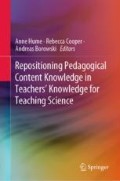Abstract
In this chapter, I discuss how two pedagogical content knowledge (PCK) models known as the pentagon model of PCK and the indispensable and idiosyncratic PCK model can be situated within the Refined Consensus Model (RCM) of PCK as I reflect on examples of my earlier research in science teacher education. To guide my previous research, I used the pentagon model of PCK to capture and portray PCK and the indispensable and idiosyncratic PCK model to measure and assess PCK. I also illustrate how research methods drawn from these two existing models, including approaches such as PCK mapping, in-depth analysis of PCK, PCK surveys, and PCK rubrics, align with the RCM and what insights the RCM provides for improving these methods and advancing PCK research. The body of this chapter is structured around four distinctive features of the RCM, compared to the earlier Consensus Model (CM), that emerged through a critical comparison of the new model with the two extant PCK models, i.e. the RCM’s (1) emphasis on learning context for capturing PCK, (2) explicit visual representation of the link between PCK and the enactment of PCK, (3) distinction between personal PCK and collective PCK, and (4) shift in focus towards PCK development. Major methodological suggestions emerging from this critique for future research into science teacher education using the RCM include data collection encompassing the entire pedagogical cycle and greater attention to contextual factors, student learning, and pedagogical reasoning.
Access this chapter
Tax calculation will be finalised at checkout
Purchases are for personal use only
References
Barnett, J., & Hodson, D. (2000). Pedagogical context knowledge: Toward a fuller understanding of what good science teachers know. Science Education, 85, 426–453.
Baxter, J. A., & Lederman, N. G. (1999). Assessment and measurement of pedagogical content knowledge. In J. Gess-Newsome & N. G. Lederman (Eds.), Examining pedagogical content knowledge (pp. 147–161). Dordrecht, Netherlands: Kluwer Academic Publishers.
Berry, A., Depaepe, F., & van Driel, J. (2016). Pedagogical content knowledge in teacher education. In J. Loughran & M. L. Hamilton (Eds.), International handbook of teacher education (pp. 347–386). Singapore: Springer.
Coffey, A., & Atkinson, P. (1996). Making sense of qualitative data: Complementary research strategies. Thousand Oaks, CA: Sage.
Depaepe, F., Verschaffel, L., & Kelchtermans, G. (2013). Pedagogical content knowledge: A systematic review of the way in which the concept has pervaded mathematics educational research. Teaching and Teacher Education, 34, 12–25.
Donnelly, J. F. (2001). School science teaching as a profession: Past, present, and future. School Science Review, 82(300), 31–39.
Donovan, M. S., & Bransford, J. D. (Eds.). (2005). How students learn: Science in the classroom. Washington, DC: National Academy Press.
Fenstermacher, G. D. (1994). The knower and the known: The nature of knowledge in research on teaching. In L. Darling-Hammond (Ed.), Review of research in education (pp. 3–56). Washington, DC: American Educational Research Association.
Gess-Newsome, J. (2015). A model of teacher professional knowledge and skill including PCK. In A. Berry, P. Friedrichsen, & J. Loughran (Eds.), Re-examining pedagogical content knowledge in science education (pp. 28–42). New York: Routledge.
Hiebert, J., Gallimore, R., & Stigler, J. W. (2002). A knowledge base for the teaching profession: What would it look like and how can we get one? Educational Researcher, 31(5), 3–15.
Park, S. (2005). A study of PCK of science teachers for gifted secondary students going through the national board certification process (Unpublished doctoral dissertation). University of Georgia, Athens.
Park, S., & Chen, Y.-C. (2012). Mapping out the integration of the components of pedagogical content knowledge (PCK) for teaching photosynthesis and heredity. Journal of Research in Science Teaching, 49(7), 922–941.
Park, S., Jang, J., Chen, Y.-C., & Jung, J. (2011). Is pedagogical content knowledge (PCK) necessary for reformed science teaching?: Evidence from an empirical study. Research in Science Education, 41, 245–260.
Park, S., & Oliver, J. S. (2008a). Revisiting the conceptualisation of pedagogical content knowledge (PCK): PCK as a conceptual tool to understand teachers as professionals. Research in Science Education, 38(3), 261–284.
Park, S., & Oliver, J. S. (2008b). National board certification (NBC) as a catalyst for teachers’ learning about teaching: The effects of the NBC process on candidate teachers’ PCK development. Journal of Research in Science Teaching, 45(7), 812–834.
Park, S., & Suh, J. (2015). Trajectory from portraying toward assessing PCK: Drives, dilemmas, and directions for future research. In A. Berry, P. Friedrichsen, & J. Loughran (Eds.), Re-examining pedagogical content knowledge in science education (pp. 104–119). New York: Routledge.
Park, S., Suh, J., & Seo, K. (2017). Development and validation of measures of secondary science teachers’ PCK for teaching photosynthesis. Research in Science Education.
Schneider, R. M., & Plasman, K. (2011). Science teacher learning progressions: A review of science teachers’ pedagogical content knowledge development. Review of Educational Research, 81(4), 530–565.
Schön, D. A. (1983). The reflective practitioner: How professionals think in action. New York: Basic Books.
Settlage, J. (2013). On acknowledging PCK’s shortcomings. Journal of Science Teacher Education, 24, 1–12.
Shulman, L. (2015). PCK: Its genesis and exodus. In A. K. Berry, P. Friedrichsen, & J. J. Loughran (Eds.), Re-examining pedagogical content knowledge in science education (pp. 3–13). New York: Routledge.
Suh, J., & Park, S. (2017). Exploring the relationship between pedagogical content knowledge (PCK) and sustainability of an innovative science teaching approach. Teaching and Teacher Education, 64, 246–259.
Tesch, R. (1990). Qualitative research: Analysis types and software tools. New York: Falmer Press.
Author information
Authors and Affiliations
Corresponding author
Editor information
Editors and Affiliations
Rights and permissions
Copyright information
© 2019 Springer Nature Singapore Pte Ltd.
About this chapter
Cite this chapter
Park, S. (2019). Reconciliation Between the Refined Consensus Model of PCK and Extant PCK Models for Advancing PCK Research in Science. In: Hume, A., Cooper, R., Borowski, A. (eds) Repositioning Pedagogical Content Knowledge in Teachers’ Knowledge for Teaching Science. Springer, Singapore. https://doi.org/10.1007/978-981-13-5898-2_4
Download citation
DOI: https://doi.org/10.1007/978-981-13-5898-2_4
Published:
Publisher Name: Springer, Singapore
Print ISBN: 978-981-13-5897-5
Online ISBN: 978-981-13-5898-2
eBook Packages: EducationEducation (R0)

